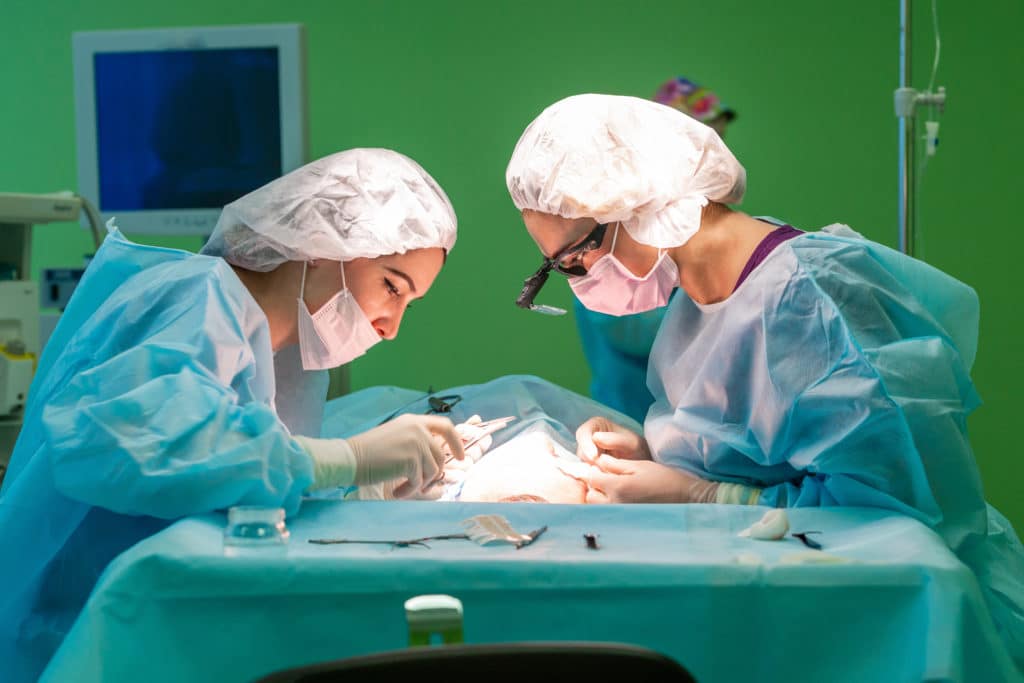Understanding Your Breast Reconstruction Options
If you have had a mastectomy, either because you’ve been diagnosed with breast cancer or are at high risk of developing breast cancer, you may decide to have a breast reconstruction.
This is a very personal decision to make and it’s best to know all your options before choosing what is best for you.
If you have been diagnosed with breast cancer and need to undergo surgery as part of your treatment, you will be referred to a breast surgeon.
Dr Stuart McIntosh is a specialist breast surgeon at Belfast City Hospital, Ireland.
He said every person who has undergone or will undergo a mastectomy, should understand their reconstruction options.
“I think all women who are having a mastectomy are entitled to have a conversation about breast reconstruction and whether it’s something they want to peruse.”
Dr McIntosh emphasised there is no one-size-fits-all approach to breast reconstruction and patients should discuss the best option for their individual circumstance with their surgeon.
He said when talking to patients, he ensures they understand what the outcome of the surgery will be.
“I do stress to patients that breast reconstruction is not about putting back the breast that we’re removing in the mastectomy. It’s about trying to mimic the appearance as much as possible and trying to maintain the natural symmetry, at the very least in clothing; swimming costumes, a bra, without having to wear an external prosthesis.”
He said there are a variety of options available for those seeking a reconstruction.
“There are a variety of different types of implants and different ways of using those implants, such as putting them under the muscle of the chest wall or putting them on top of the muscle.”
“There is also the option to reconstruct the breast using the patient’s own tissue, whether taken from places like the back or the tummy, or sometimes even the buttock or the thigh.”
Do I Need To Have A Reconstruction After My Breast Cancer Surgery?
You can choose to not undergo a reconstruction if you do not want to.
While a lot of your treatment after a breast cancer diagnosis is determined by the expertise of your treatment team, you have more choice and control in regard to your reconstruction options.
This includes whether to have a reconstruction or not.
Dr McIntosh said that each patient will have differing priorities when it comes to their reconstruction options.
“I think for some people, treating the cancer and putting it behind them is very important. So, they may choose to have the simplest option so they can get the treatment behind them and get on with their life.”
“I think for some patients there is a need to have control over the procedure.”
“They’re being told they have to have a mastectomy; they have to have other treatments…being able to have a reconstruction is their way of maintaining some input or some control into the treatment process.”
“And for some women it’s an integral part of their self-image or their self-esteem.”
Listen to the podcast
We spoke with specialist breast surgeon at Belfast City Hospital, Ireland, Dr Stuart McIntosh, about breast reconstruction options, what you need to consider before making a decision and what are the best questions to ask your doctor during your decision making process.
He emphasised that there is no correct answer and each patient will have different considerations that will influence their decision.
“Interestingly the uptake in immediate reconstruction, that’s a reconstruction at the same time as a mastectomy, has always hovered around the 25% mark and I think it’s important to make women aware that it is their choice.”
“They have the freedom to choose in this setting and not having a reconstruction is a legitimate choice, as is having a reconstruction,” he said.
“Some women feel that they must have it done and it’s important to make them recognise that this part of the treatment is their decision.”
What Else Do I Need To Consider If I Have Chosen To Get A Reconstruction?
Dr McIntosh said that your surgeon will consider your treatment regime and overall health and wellbeing when they are planning your reconstruction.
“There are factors around your cancer treatment we need to take into account when planning a reconstruction.”
“So, perhaps the patient is going to need radiotherapy after a mastectomy, we might want to consider that when making choices.
“We always also want to consider the general health and fitness of the patient, because having an immediate reconstruction is, without doubt, a bigger operation than having a mastectomy on its own.”
“So, it is important to take into account the general health, fitness, ability to withstand a longer operation and the increased risk of complications.”
Dr McIntosh said each surgical option will take a varying amount to undertake and recover from which may be an important consideration for a patient and their surgeon.
“A simple mastectomy without reconstruction may take 45 minutes to an hour.”
“An implant-based reconstruction may take a couple of hours, whereas reconstruction using patients own tissue may take four, five, six hours depending on where the tissue is coming from and how complex the procedure is.”
“And, obviously, the length of recovery is variable dependent on those features as well.”
What Questions Should I Ask Before I Make My Decision?
Dr McIntosh said that when you meet with your surgeon, ask as many questions as you need and don’t be afraid to express any concerns you may have.
He said to consider asking about how your options may affect your cancer treatment pathway or the timing of treatments.
He also said it was important to learn about the pros and cons of each option.
“Usually when I’m having this type of consultation with a patient, we’ll go through photographs so they can see examples of how the different reconstruction types look and perhaps some examples of ones that have worked well, and perhaps examples of ones that have not worked so well.”
“I think it’s increasingly important for patients, if they’re having implant-based reconstruction, to be able to know what type of implant are likely to be used, whether the surgeon is planning to use any mesh to assist with the reconstruction and if it were me, I’d want to know that these are devices that had good scientific evidence or data underlying them, so we know that they’re safe to be in use.”
And probably it’s always worth asking your surgeon how many times he or she has done that particular operation.”
While Dr McIntosh encourages patients doing their own research into their options, he strongly emphasises the importance of only reading reputable sources.
“While there is great information available online, you have to be careful as it’s not always applicable to everybody and some of it is better quality than others.”
“I would encourage people to do their own research, but then I would ask them to take that research back to your surgeon and ask them the questions that have occurred to you as a result of that research.”
Dr McIntosh also emphasised that when he guides patients through this process, he will often see patients as many times as they need. He stresses that there is no need to rush into making this decision.
“Maybe we can reach a decision after two consultations.”
“It may take three, it may take four, it may take some time with the breast care nurses, sometimes it’s useful to be able to talk to another patient whose gone through the process and if somebody wants to do that, then we try very hard to put them in touch with another patient.”
QUICK ACCESS

Dr Stuart McIntosh
Support Us
Help us to change lives through breast cancer clinical trials research



